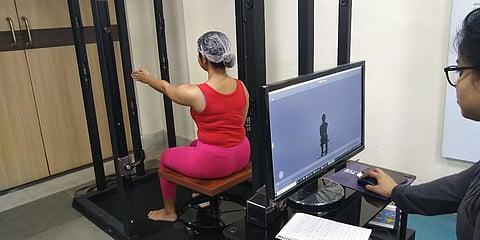

Many countries have undertaken national sizing surveys to create an anthropometric database of measurements for the correct representation of their population. But the Indian population is at a loss because the size charts we use are tweaked versions of the charts of other countries.
To put an end to this constant puzzle, and help people buy well-fitted clothes, the Ministry of Textiles and National Institute of Fashion Technology (NIFT) launched the anthropometric data collection for their INDIAsize project at Select Citywalk on Thursday.
The collaboration hopes to result in a comprehensive standardised garments size chart for the Indian population.
Upendra Prasad Singh, Secretary (Textiles), notes, "The INDIAsize survey will see the creation of a size identification number for a customer through mapping, categorisation and defining of their body size. Apart from apparels, the study's findings can be applied across other industries to produce ergonomically designed products well-suited for the Indian population."
For data collection, three 3D whole body scanners - procured from abroad - will be set up at five locations in Delhi. NIFT Professor and INDIAsize Principal Investigator, Noopur Anand, says, "We will set up the scanners at Select Citywalk, Mahagun Mall and NIFT campus. Then, we will move them to two more locations in the next 15-20 days."
"After that, these machines will be sent to Mumbai, Chennai, Hyderabad, Kolkata and Shillong. We will measure a total of 25,577 people between 15-65 years across six cities from six regions of India," adds Anand.
Apart from the six core members, there are experts to operate scan machines (each booth will have seven people), and one project coordinator for all six regions in India. "NIFT has worked on this idea for several years, but this time the ministry also felt it’s the need of the hour with e-commerce going up, decreasing sales and increasing returns," explains Anand.
The experts have created a sleeveless top and a 3/4th legging for women, and vest and cycling shorts for men as scan suits. "Made from a knitted fabric and lycra (for stretchability), the scan suit is designed to not compress the body’s dimension, and not loose enough to add to the dimension. We have eight size ranges and the size is issued to the person depending upon their chest size," she informs.
A person has to enter the scanning machine after wearing the scan suit. Isn’t this a cumbersome process? "We have come across many people open to the idea of trying out the suit and wanting to know how the machine works. Moreover, we are creating history, and everybody wants to be a part of it," says Anand.
When the body measurements are taken manually for 120 data points, it takes five-six hours. She says, "We have already done this activity. A total of 130 participants were measured manually for 102 data points in the pilot run. But in the scanning machine, it just takes 10 seconds in one posture. The person is scanned in under a minute."
The machine collects a scan that is called Avataar, which is then run through the specially created software, and measurements are extracted accordingly. "Those measurements then have to be populated and combined with social demographics that we are collecting. This is how we will create a database," she adds.
COVID was a setback to the project given the necessity for physical contact. "But we have worked out the COVID protocols. Moreover, the scan suit is a giveaway to the person who gets scanned at the machine. We are targeting December 2022 as the finish point," she says.
IN A NUTSHELL
To help people buy well-fitted clothes, the Ministry of Textiles and National Institute of Fashion Technology (NIFT) launched the anthropometric data collection for their INDIAsize project at Select Citywalk on Thursday.
The collaboration hopes to result in a comprehensive standardised garments size chart for the Indian population. For data collection, three 3D whole body scanners - procured from abroad will be set up at five locations in Delhi.